八年级英语上册Unit1 Topic1 Section D导学案
仁爱版英语八年级上册 Unit 1 Topic 1 Section B 导 学案

Unit 1 Topic 1 Section B 导学案明溪县盖洋中学陈秀琴一、学习目标:1、继续学习be going to的用法2、谈论学生喜欢的体育项目和运动员3、学习职业的单词,学会讨论dream job二、预习指导:1自读单词表找出下列单词并背诵(1.)写出下列职业并变成复数运动员科学家音乐家飞行员男警察女警察邮递员_ 渔民(2)自学第3页的内容并从中找出下列短语。
最喜欢的运动最喜欢的运动员为…效力长大梦想的工作在将来三、重难点点拨1.He played for the Houston Rochets in the NBA.play for +队名,为某队效力Tom likes basketball very much. He wants to play______ the NBA when he grows up.A.With B.for C. Of D.To2.What are you going to be when you grow up?grow up 长大,生长我长大后想要成为一名医生。
I’m going to be a doctor when I ______ ______.be going to be + 职业“将要成为···”Are you going to ______a teacher?你会成为一个老师吗?He ______ ______ ______a farmer when he ______ ______. .他长大后将要成为一个农民。
3.in the future 在将来他将来想成为一名警察He is going to be a policeman ______ ______ ______ 4.favorite =like… best What’s your favorite sport? =What sport do you like best ? What’s your favorite player?同义句:_______________________________________________四、课堂检测读1a,根据短文内容填空Maria’s favorite sport is_________.Her favorite player is__________.But when she ______ ______ (长大),she is going to be a______.Michael’s favorite sport is_______, too.His favorite player is______.He is_____meters tall.He______ ______the Houston Rockets in the NBA.Michael is going to ____ a basketball player like him.That’shis_______.五、课后测评反馈:1. I want to be a teacher ________ ________ ________(在将来).2. Who’s your _______________ (最喜欢的运动员)?3.What’s your _____________ (梦想的工作)?4.I hope I can ______ ______NBA when I grow up (为…效力)5. What do you want to be when you ________ _________ (长大)?。
人教版八年级上册英语单元教案(含教材分析)--Unit 1

Unit 1Where did you go on vacation?本单元教材以Where did you go on vacation?为中心话题,围绕着描述“过去发生的事情”展开,学习和运用一般过去时态的一般疑问句Did you go/see/buy...?和特殊疑问句Where/What/How...?询问过去的事件,让学生学会谈论和分享过去发生的事件。
本课教学内容与学生的实际生活密切相关,易于引发学生运用简单的英语进行交流。
在学习活动中,学生通过交换对过去发生的事情的描述及看法,促进学生之间和师生之间的情感交流,增进情谊。
Section A的主要学习内容是:复习一般过去时态和动词的规则与不规则变化,学习一般过去时态的一般疑问句:Did you...?及不定代词的用法。
Section B安排了许多听、说、读、写的任务活动,教师在教学中可以灵活运用这些活动,将其中的一些活动进行变化或整合,充分调动学生参与的积极性,提高学生的听说读写能力。
第一课时Section A(1a-2d)Teaching Goals【教学目标】Key words & phrases:anyone,anywhere,wonderful,few,most,quite a few,go on vacationKey sentences:1.Where did you go on vacation?I went to the mountains/New York City/summer camp/the beach.2.Did you...?Yes,I did./No,I didn't.Teaching Key Points【教学重点】The vocabulary:New York City,Central Park,few,most,quite a few,on vacationTarget language:Where did you/they/he/she go on vacation?I/They/He/She went to the mountains/New York City/summer camp/the beach. Did you...?Yes,I did./No,I didn't.Teaching Difficult Points【教学难点】Use the target language above to talk about past events.Teaching Aids【教学工具】An English textbook,a tape recorder,CAI or courseware.Teaching Steps【教学过程】★Step 1Leading inGreet the class and introduce what to learn in this period.Teacher:Welcome back to school!Did everyone have a good time during the summer vacation?Today we'll begin to learn the topic where you went on vacation.Teacher:Where did you go on vacation?Students:______.①I went to the mountains.②I visited museums.…★Step 2Pre-taskPage 1,1a & 1b.1.Look at the picture.2.Match each activity.3.Check the answers in 1b.4.Practice reading.Page 1,1c.1.Focus on the conversation in the box.2.Practice reading.3.Pairwork:Where did you go on vacation?I...4.Groupwork:Divide the class into groups of four or five. Make conversations.First S1 to S2:S1:Where did you go on vacation?S2:I...S1:Where did she/he go on vacation?S2:She/He...★Step 3While-taskPage 2,2a & 2b.1.Play the recording for the first time. Students complete the chart in 2a.2.Check the answers.(Point to one student who raises his or her hand.)3.Play the recording a second time and say:There are three conversations. The people talk about where they went on vacation. Listen to the recording and check(√)Yes,I did or No,I didn't for each question.4.Correct the answers.★Step 4Post-taskPage 2,2c & 2d.1.Focus on the conversation in 2c & 2d.2.Practice reading. Make students scan the conversations first.3.Teach and then make students role-play the conversation in pairs.4.Have a group of students present their conversation to the class.★Step 5Homework1.Practice the conversation on Page 2,2d.2.Do the exercises on Page 1 in students' book.Board Design板书设计Unit 1Where did you go on vacation?The first period Section A(1a-2d)1.Key vocabulary:anyone,anywhere,wonderful,quite a few,go on vacation 2.Target language:A:Where did Tina go on vacation?B:She went to the mountains.第二课时Section A(GF-3c)Teaching Goals【教学目标】Key words:something,nothing,everyone,myself,yourself,someone,seem,bored,diaryKey phrases:go out,have a good time,of course,keep a diaryKey sentences:1.Where did you go on vacation?I went to New York City.2.Did you go out with anyone?Did you buy anything special?3.How was the food?How was your vacation?Teaching Key Points【教学重点】The vocabulary:something,nothing,everyone,myself,yourself,someone,seem,bored,diary,go out,have a good time,of course,keep a diary,on vacation Target language:How was the food?Everything tasted really good!Did you go shopping?Of course!Did everyone have a good time?Oh,yes. Everything was excellent.Teaching Difficult Points【教学难点】e the target language above to talk about past events.2.The usage of someone,anyone,everyone,no one,something,anything,everything,nothing.Teaching Aids【教学工具】An English textbook,CAI or courseware.Teaching Steps【教学过程】★Step 1Leading in(T—teacher S—student)T:Where did you go last weekend?S:I went to the beach.T:Did you go there with anyone?S:Yes. I went to the beach with my brother.T:Did you have a good time there?S:...★Step 2Pre-taskPage 3,Grammar Focus.1.Review the grammar box. Work in pairs. One asks and the other answers.2.Practice reading the sentences in the chart.★Step 3While-taskPage 3,3a & 3b.1.Teach these new words:anyone,something,anything,everything,nothing,everyone,no one.2.Call students' attention to the conversation in 3a. Make students complete it individually.3.Choose a student to give his or her answers. Write the answers on the board.4.Correct the answers.5.Lead students to read this conversation.6.Have students work in pairs and role-play the conversation. As they talk,move around the classroom monitoring their work. Offer language or pronunciation support as needed.7.Make students complete the blanks in the e-mail message in 3b with the words in the box.8.Check the answers and then make students practice reading it.★Step 4Post-taskPage 3,3c.Complete the task in 3c.Ask your group questions about their last vacation. Then tell the class your results.★Step 5Homework1.Review the indefinite pronouns learned in this period.2.Do the exercises on Page 2 in students' book.Board Design板书设计Unit 1Where did you go on vacation?The second period Section A(GF-3c)1.The vocabulary:something,nothing,everyone,someone,myself,yourself,go out,of course2.Target language:①A:Where did you go on vacation?B:I went to New York City.②A:Did you buy anything special?B:Yes,I bought something for my father.3.Structure:something special4.Answers to 3a and 3b.第三课时Section B(1a-1e)Teaching Goals【教学目标】Key words:delicious,exciting,terrible,expensive,cheap,boringKey sentences:1.Where did Lisa go on vacation?2.Did she do anything special there?Did she buy anything for her best friend?Did Lisa like her vacation?3.How was/were...?Teaching Key Points【教学重点】The vocabulary:delicious,exciting,terrible,expensive,cheap,boringTarget language:Where did Lisa go on vacation?Did she do anything special there?Did she buy anything for her best friend?How was/were...?Teaching Difficult Points【教学难点】1.询问去过何地以及感受(评价)Where did you go?I went to the beaches. How was it?It was exciting.2.Use the target language to talk about your past events.Teaching Aids【教学工具】An English textbook,a tape recorder,CAI or courseware.Teaching Steps【教学过程】★Step 1Leading in1.Greetings.2.T:Where did you go on vacation?S:I went to summer camp.T:Did you do anything special there?S:Yes,I...T:Did you buy anything for your parents or friends?S:Yes,I bought...for.../No,I bought nothing.T:How was/were...?S:It was/They were...★Step 2Pre-taskPage 4,1a & 1b.1.Look at the six pictures.2.Match the words with the pictures.3.Students complete the task in 1b individually.4.Check the answers.★Step 3While-taskPage 4,1c & 1d.1.Make students scan the questions in 1c.2.Play the recording for the first time. And say:Listen to the tape. Lisa is talking about her vacation. Complete the four questions.3.Play the recording a second time. Students complete the task in 1d.4.Correct the answers.★Step 4Post-taskPage 4,1e.Ask 3 or 4 students to answer questions about Lisa's vacation. You can begin your questions with:Where did...?What did...?Did she...?How was...?How were...?★Step 5Homework1.Review these sentences:Where did...?Did...?How was/were...?2.Do the exercises on Page 3 in students' book.Board Design板书设计Unit 1Where did you go on vacation?The third period Section B(1a-1e)1.Words:delicious,exciting,terrible,expensive,cheap,boring2.Sentences:①Where did Lisa go on vacation?②Did she buy anything special?③Did she buy anything for her best friend?④Did Lisa like her vacation?3.Answers to Activity 1a:1—5f a c e b dAnswers to Activity 1b:wordsdeliciousexcitingcheapwordsterribleexpensiveboring第四课时Section B(2a-2e)Teaching Goals【教学目标】Key words:activity,decide,try,bird,bicycle,building,trader,wonder,difference,top,wait,umbrella,wet,below,enough,hungry,asKey phrases:feel like,because of,go to the beach,a lot of,a little,take the train,too many,what aboutKey sentences:1.I wonder what life was like here in the past.2.What a difference a day makes!3.We waited over an hour for the train because there were too many people.Teaching Key Points【教学重点】Learn Jane's diary entries about her vacation.1.The vocabulary:activity,decide,try,wonder,difference,wait,below,enough,hungry,as,feel like,because of2.Target language:I wonder what life was like here in the past. We waited over an hour for the train because there were too many people.Teaching Difficult Points【教学难点】1.because and because of2.What a difference a day makes!3.Learn to write a diary.Teaching Aids【教学工具】An English textbook,CAI or courseware.Teaching Steps【教学过程】★Step 1Leading in1.Greetings.2.Introduce what to learn in this period,especially the articles in 2b,Jane's diary entries. Teacher begins like this:Today we'll focus on two diary entries about Jane's vacation. Through the learning you'll know how to write a diary. Let's begin now.★Step 2Pre-taskPage 5,2a & 2b.1.Review and discuss the questions in 2a box with your partner.2.Project these new words on the screen or write them on the board and teach the new words. Ask students to repeat them. And make sure everyone knows the meanings.activity n.活动;decide v.决定;try v. & n.尝试,设法;wonder v.想知道;difference n.差异;top n.顶部;wait v. & n.等待;umbrella n.伞;below prep.& adv.在……下面;enough adj.充足的;hungry adj.饥饿的3.Make students scan the articles first. Ask students to put a mark in contents that are unfamiliar to them. Then the teacher lead students to learn these two articles sentence by sentence. Pay attention to these points:(1)decide v.决定;decide to do sth.决定做某事;(2)try v.尝试;try doing sth.尝试做某事;try to do sth.尽力做某事;(3)below prep. & adv.在……下面;(4)feel like 给……的感觉;(5)because and because of;(6)wonder v.想知道4.Practice reading.★Step 3While-taskPage 6,2c & 2d.1.Make students read Jane's diary entries again. Fill in the chart in 2c.2.Students complete the conversation in 2d using the information in Jane's dairy entries.3.Choose 3 or 4 students to give their answers.4.Correct the answers.5.Have students work in pairs. Student A will be Anna and student B will be Jane. Act the conversation out.★Step 4Post-taskPage 6,2e.1.Make students complete the blanks in 2e.2.Ask one student to write his or her answers on the board.3.Check the answers together with the class.4.Practice reading.★Step 5Homework1.Write a diary.2.Do the exercises on Page 4 in students' book.Board Design板书设计Unit 1Where did you go on vacation?The fourth period Section B(2a—2e)1.Key vocabulary:decide,try,wonder,difference,top,wait,below,enough,hungry,as,feel like,because of,too many2.Sentences:①I wonder what life was like here in the past.②And because of the bad weather,we couldn't see anything below.第五课时Section B(3a-Self Check)Teaching Goals【教学目标】Key words & phrases:duck,dislike,take photos,Tian'anmen Square,the Palace Museum,bring back,shopping center,have a fun time,school trip,come upKey sentences:1.How did you feel about the trip?2.It was so beautiful that we forgot about the last five hours!Teaching Key Points【教学重点】The vocabulary:dislike,take photos,Tian'anmen Square,the Palace MuseumTarget language:What did you like best?Did you dislike anything?How did you feel about the trip?Teaching Difficult Points【教学难点】Write a travel diary.Teaching Aids【教学工具】An English textbook,CAI or courseware.Teaching Steps【教学过程】★Step 1Leading in1.Greetings.2.T:Beijing is the capital of our country. It's famous for its long history and places of interest,such as Tian'anmen Square,the Palace Museum,the Summer Palace and so on. And Beijing duck is very delicious. Have you ever been to Beijing?Tell your travel to us.★Step 2Pre-taskPage 7,3a.1.Look at the three pictures.2.Use the words and phrases in the box to complete the blanks in the article.3.Check the answers.★Step 3While-taskPage 8,Self Check.Complete the tasks in Self Check.1.Have students complete the task of Part 1.Then Choose 2 or 3 students to give their answers. Check the answers.2.Induct students to complete the passage of Part 2.Check the answers.3.Practice reading.★Step 4Post-taskPage 7,3b & 3c.1.Make students answer the questions in 3b and take notes.2.Teach students how to write a travel diary.3.Students write a travel diary like Jane's on Page 5 using the notes in 3b.4.Choose 2 or 3 students' diaries. Make students read them out. Point out the weakness and induct the students to correct their diaries.★Step 5Homework1.Write a travel diary.2.Do the exercises on Page 5 in students' book.Board Design板书设计Unit 1Where did you go on vacation?The fifth period Section B(3a-Self Check)1.Key vocabulary:dislike,Tian'anmen Square,the Palace Museum,have a fun time,come up2.Sentences:①Did you dislike anything?②How did you feel about the trip?③My legs were so tired that I wanted to stop.。
八年级英语仁爱版上册Unit1_Topic1_预习指导

Unit1 Topic1预习指导一、知识目标类别要求掌握的内容词汇during against team win cheer practice row quite join skate tennis player dream grow scientist future musician pilot policeman policewoman postman fisherman jump spend exercise baseball weekend part health popular world heart healthy fit relax famous excited badleave pity短语see sb. do sth. 看见某人做过某事cheer ... on为……加油quite a lot 经常table tennis 乒乓球grow up成长,长大成人play for效力于,为…打球in the future 今后be good at...擅长…….take part in 参加,加入the high jump 跳高the long jump 跳远be good for 对……有all over 到处,遍及the day after tomorrow后天keep healthy 保持健康make/keep sb. /sth. + adj.使某人/某物……a good way to 一个……的好办法arrive in到达leave for动身去某地句型I often saw you play basketball during the summer holidays.Would you like to come and cheer us on?What are you going to be when you grow up?She spends half an hour exercising in the gym every day.There is going to be a school sports meet next weekend.They are leaving for Japan the day after tomorrow for a game with Japan’s national team.It’s a pity that they are going to stay for about two days.语法be going to构成的一般将来时二、预习指导课前预习预习内容(资源名称)预习模块Section ASectionA单词学习SectionA 1a 课文学习SectionA 基础知识预习检测Section BSectionB 单词学习SectionB 1a 课文学习SectionB 基础知识预习检测Section CSectionC 单词学习SectionC 1a 课文学习SectionC 基础知识预习检测Section DSectionD 单词学习SectionD 1a 课文学习SectionD 基础知识预习检测高分秘籍巧解妙做—阅读技能专项提升典例分析—必考知识点汇编温馨提示:预习小策略课前预习要做到看、做、思结合。
八年级英语Unit1Topic1 Section D
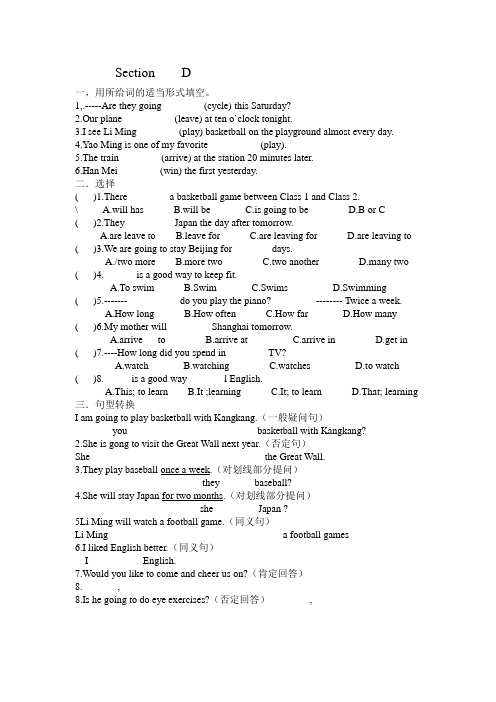
Section D一,用所给词的适当形式填空。
1,.-----Are they going ________(cycle) this Saturday?2.Our plane __________(leave) at ten o`clock tonight.3.I see Li Ming ________(play) basketball on the playground almost every day.4.Yao Ming is one of my favorite __________(play).5.The train ________(arrive) at the station 20 minutes later.6.Han Mei ________(win) the first yesterday.二.选择( )1.There ________a basketball game between Class 1 and Class 2.\ A.will has B.will be C.is going to be D.B or C ( )2.They _________ Japan the day after tomorrow.A.are leave toB.leave forC.are leaving forD.are leaving to ( )3.We are going to stay Beijing for _______ days.A./two moreB.more twoC.two anotherD.many two ( )4.______ is a good way to keep fit.A.To swimB.SwimC.SwimsD.Swimming ( )5.-------__________ do you play the piano? -------- Twice a week.A.How longB.How oftenC.How farD.How many ( )6.My mother will ________ Shanghai tomorrow.A.arrive toB.arrive atC.arrive inD.get in ( )7.----How long did you spend in ________TV?A.watchB.watchingC.watchesD.to watch ( )8._____ is a good way _______l English.A.This; to learnB.It ;learningC.It; to learnD.That; learning 三.句型转换I am going to play basketball with Kangkang.(一般疑问句)_______ you _______ _______ _______ basketball with Kangkang?2.She is gong to visit the Great Wall next year.(否定句)She _______ _______ ______ _______ the Great Wall.3.They play baseball once a week.(对划线部分提问)_______ _______ _______ they ______ baseball?4.She will stay Japan for two months.(对划线部分提问)_______ _______ _______she ________ Japan ?5Li Ming will watch a football game.(同义句)Li Ming ______ _______ _______ ________ a football games6.I liked English better.(同义句)I __________ English.7.Would you like to come and cheer us on?(肯定回答)8._______,_ _______ ______ _______8.Is he going to do eye exercises?(否定回答)______, _______ ________。
仁爱英语八年级Unit 1-Topic1-SectionD
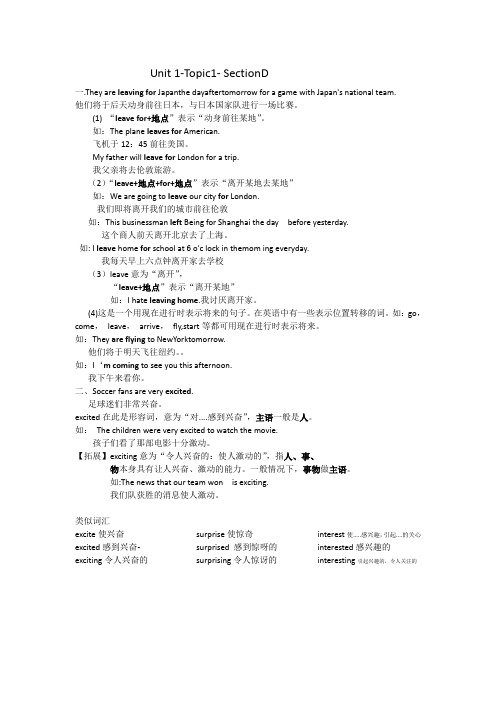
Unit 1-Topic1- SectionD一.They are leaving for Japanthe dayaftertomorrow for a game with Japan's national team.他们将于后天动身前往日本,与日本国家队进行一场比赛。
(1) “leave for+地点”表示“动身前往某地”。
如:The plane leaves for American.飞机于12:45前往美国。
My father will leave for London for a trip.我父亲将去伦敦旅游。
(2)“leave+地点+for+地点”表示“离开某地去某地”如:We are going to leave our city for London.我们即将离开我们的城市前往伦敦如:This businessman left Being for Shanghai the day before yesterday.这个商人前天离开北京去了上海。
如: I leave home for school at 6 o'c lock in themom ing everyday.我每天早上六点钟离开家去学校(3)leave意为“离开”,“leave+地点”表示“离开某地”如:I hate leaving home.我讨厌离开家。
(4)这是一个用现在进行时表示将来的句子。
在英语中有一些表示位置转移的词。
如:go,come,leave,arrive,fly,start等都可用现在进行时表示将来。
如:They are flying to NewYorktomorrow.他们将于明天飞往纽约。
如:I‘m coming to see you this afternoon.我下午来看你。
二、Soccer fans are very excited.足球迷们非常兴奋。
excited在此是形容词,意为“对....感到兴奋”,主语一般是人。
仁爱版八年级英语上册Unit1_Topic2_SectionD教案设计
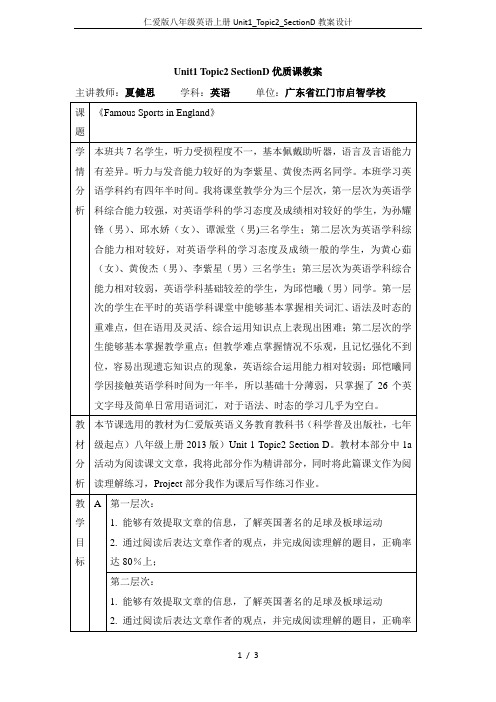
本节课选用的教材为仁爱版英语义务教育教科书(科学普及出版社,七年级起点)八年级上册2013版)Unit 1 Topic2 Section D。教材本部分中1a活动为阅读课文文章,我将此部分作为精讲部分,同时将此篇课文作为阅读理解练习,Project部分我作为课后写作练习作业。
教学目标
A
第一层次:
四、新授及练习环节
(一)总体介绍英国著名运动的情况
(二)教师讲解英国著名足球运动介绍并请学生复述
(三)《The Origin of Football》快读阅读练习及讲解
(四)教师讲解英国著名板球运动介绍并请学生复述
(五)《Sports in the USA》阅读理解练习及讲解
五、总结英国著名运动
六、布置作业,下课
1.能够有效提取文章的信息,了解英国著名的足球及板球运动
2.通过阅读后表达文章作者的观点,并完成阅读理解的题目,正确率达80%上;
第二层次:
1.能够有效提取文章的信息,了解英国著名的足球及板球运动
2.通过阅读后表达文章作者的观点,并完成阅读理解的题目,正确率达50%上;
第三层次:
能够有效提取文章的信息,了解英国著名的足球及板球运动。
2.情感、态度与价值观的教学目标突出不够鲜明,可以加上一点球类运动的团结合作的重要性;
3.学生参与课堂较少,教师组织课堂的节奏过于急促,学生掌握技能及新知的情况有待加强;
4.学生依然较畏惧发言及表达自我观点,缺乏自信,不爱开口“说”;
5.板书没有突出重点。
CricketΒιβλιοθήκη summergrass (the green)
2 teams (11 players)
white
point,hit,bat
八年级上册英语第一单元第一话题Section D
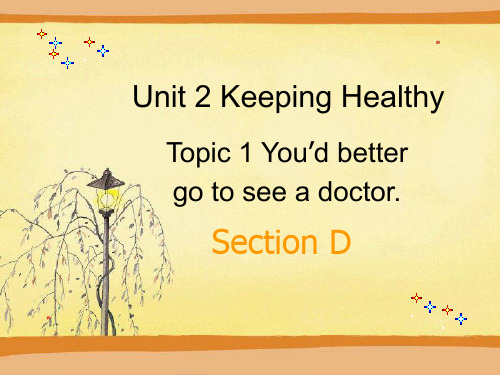
Both Liu Xiang and Yao Ming are super stars. Both Jim and I _____sick. are We both(仅用于两者) like football a lot. (仅用于两者) The students in our class are all (用于三者以上) 用于三者以上) 用于三者以上 great.
Do some eห้องสมุดไป่ตู้ercise:
1. --- I have a terrible toothache. see a dentist --- I’m sorry to hear that. You should_______ ______ __________ . had better not 2. She has a bad cold. She ______ ______ ______ drink cold water. What’s wrong with you 3. --- ________ _________ _________ _______ , Lily ? --- I feel terrible, Mum. Thank you 4. --- I hope you will get well soon. --- _________ __________ . 5. ______ ________ _______ have a good rest? (你为什么不 你为什么不) 你为什么不 Why don’t you worry about 6. Don’t _______ ________ me. I will get well in two days. (担心 担心) 担心 7. Thank you ________ these beautiful flowers. B A. at B. for C. of D. to
仁爱版英语八年级上册Unit1 Topic1教案

仁爱版英语八年级上册Unit 1 Topic 1教案Section AThe main activities are 1a and 2. 本课重点活动是1a和2。
Ⅰ.Teaching aims and demands 教学目标1. Learn some new words and phrases:almost, against, term, cheer, cheer … on, team, win, row, quite, bit, quite a bit/a lot, join, club, skate, volleyball, tennis, table tennis2. Learn some useful sentences:(1)I saw you play basketball almost every day during the summer holidays.(2)Would you like to come and cheer us on?3. Learn the future tense with be going to:(1)We are going to have a basketball game against Class Three on Sunday.(2)Are you going to join the school rowing club?4. Talk about preferences:—Which sport do you prefer, cycling or rowing?—I prefer rowing.5. Talk about sports and games.Ⅱ. Teaching aids 教具图片/海报/教学挂图/录音机/小黑板Ⅲ. Five-finger Teaching Plan 五指教学方案Step 1 Review 第一步复习(时间:7分钟)复习学过的运动项目名称,引出生词。
新仁爱版八年级英语上册Unit1 Topic 1 I’m going to play basketball.整单元全英文教案
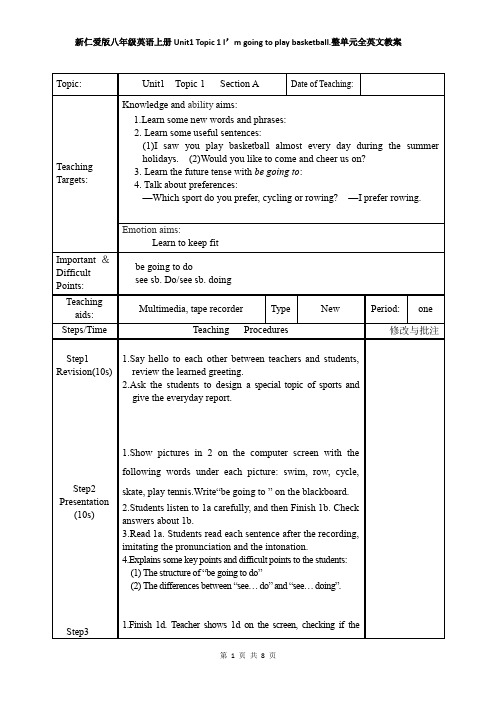
Teaching Targets:
修改与批注
Step1 1.Say hello to each other between teachers and students, Revision(10s) review the learned greeting. 2.Ask the students to design a special topic of sports and give the everyday report.
Step4 Practice (10s)
1.Do 3b .Ask and answer with students.Then help students do the pairwork. 2.Show summary on the screen. 3. Assign homework. Write an essay about your own sports plan. 4. Ask students to prepare Section B after class.
Homework:
Blackboard Design
1.Review the words and I’m going to play basketball? practice the conversations Section A in Section A prefer I prefer rowing. 2.Finnish workbook. be going to + do sth.cheer … on quite a bit / a lot 3.Preview Section B. We are going to have a basketball game against Class Three on Sunday. Which sport do you prefer, cycling or rowing? Are you going to join the school rowing club? Yes, I am./No, I’m not. I’m going to … Thinking after teaching:
仁爱英语八年级上册Unit1Topic1I‘mgoingtoplaybasketball._导学案

Unit 1 Topic 1 Section A(一)翻译1、同…进行一场篮球比赛____________2、为我们加油______________3、更喜欢划船________________4、常常,非常多____________5、参加学校划船队______________6、计划做,打算做______________(二) 质疑探究:1、【课文原句】I?m going to play basketball.译文________________________________________________.【分析点拨】be going to的用法⑴be going to有“准备;打算”的意思。
含有be going to结构的句子中往往有表示将来的时间状语。
例如:We _____ going to ________ a class meeting this afternoon.今天下午我们打算开班会。
(安排)Look at the black clouds. It ________ going to ________.看那些乌云,快要下雨了。
(推测)⑵be going to在肯定句中的形式be going to结构中的助动词be有三种形式,即:am , is , are。
当主语是I 时用______;当主语是第三人称单数时用______;当主语是其他人称时用______。
例如:I ______________________something tomorrow morning.明天早上我要去买些东西。
She ________________________Mr. Wang tomorrow. 她打算明天去看望王先生。
⑶含be going to的句子变否定句和一般疑问句的变法在be (am, is, are)的后面加上_______就构成了否定句;把_______放到句首,在句末加问号就构成了一般疑问句,其答语为:Yes,主语+ am/is/are. / No,主语+ isn't/aren't. / No, I'm not.不过I am...在改为一般疑问句时常常改为“Are you ....?”。
八年级英语上册Unit1PlayingSportsTopic2I’llkickyoutheballagainSectionD辅学导学案
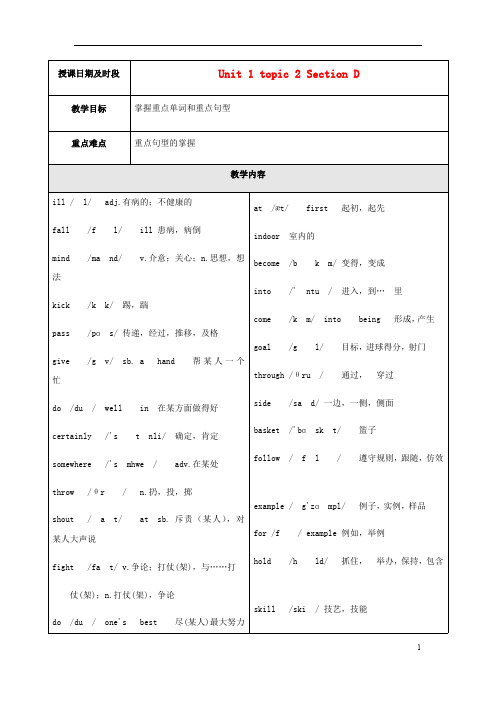
teamwork /'tiŋmwŋŋk/协同工作,配合angry /'æŋgri/发怒的,愤怒的,生气的be /biŋ/angry with 生(某人)的气nothing /'nŋθŋŋ/pron.没有什么;没有一件东西finish /'fŋnŋŋ/完成,做好,最后部分grandfather /'grændŋfɑŋðŋ/(外)祖父,爷爷,外公invent /ŋn'vent/v.发明,创造inventor /ŋn'ventŋ/发明家,创造者court /kŋŋt/n.球场,运动场;法庭;法院outdoors /aŋtŋdŋŋz/在户外,在野外century /'sentŋŋri/n.世纪,百年as /æz/ 作为,当然像…一样,因为than /ðæn/ 比score /skŋŋ/v.得分;进球;n.得分,lover 爱好者,热爱着cricket 板球(运动)main /meŋn/主要的person /'pŋŋsn/人,个人hero /ŋhŋŋrŋŋ/英雄grass /grɑŋs/草坪,草地point /pŋŋnt/得分,观点,v.指着hit /hŋt/击球,碰撞bat /bæt/ 球拍,蝙蝠一、学习目标 Aims and Demands学习复合形容词的用法。
二、学法指导 How to study1. 预习Unit 1 Topic 2 SectionD,并对语言点、难点做出标记;2. 学习学案,并完成学案上的练习题。
三、自主预习Ⅰ.英汉互译下列单词并标上词性。
1.相反,而不是 __________( )2. 巧克力 ___________( )3. 疲惫的 __________( )4. 练习 ___________( )5. 通过 __________( )6.英里 ___________( )7. 新鲜的 __________( ) 8. 然而,可是___________( ) II.在课本中找出下列短语划在书上并翻译1. 一个十五岁的男孩 ___________2.感到疲惫 _______________3.一段1.5英里的跑步______________4.强壮身体 _______________5. 感觉很健康 ____________6.看起来很健康 _______________7.在……擅长 _____________ 8.运动会 ________________9.男子800米赛跑 ________________ 10. 相反,而不是 ______________11. 全世界 _________________ 12.为了娱乐 _______________Ⅲ. 翻译并熟记下列句子.1.我从跑步中获得很大的乐趣。
八年级上册问题解决导学方案英语听力unit1

八年级上册问题解决导学方案英语听力unit1八年级上册Unit 1的英语听力导学方案可以设计如下:
学习目标:
1. 掌握关于介绍个人基本信息的常用表达。
2. 学会在听力材料中获取关键信息。
3. 能够用所学知识进行简单的自我介绍。
学习内容:
听力材料:
1. 自我介绍的基本信息:姓名、年龄、爱好等。
2. 个人信息获取的常见问题与回答。
学习过程:
1. 听力训练:播放两遍听力材料,学生听并获取关键信息。
2. 知识讲解:教师讲解听力材料中的生词、短语及句型,帮助学生理解。
3. 互动问答:学生分组,模拟对话,互相提问和回答关于个人信息的问题。
4. 模仿跟读:学生模仿并跟读听力材料,纠正发音,培养语感。
5. 实际应用:布置任务,让学生使用所学知识,进行自我介绍。
学习评估:
1. 课堂检测:课堂上进行简短的听力小测验,检查学生对听力内容的理解。
2. 课后作业:要求学生编写一篇自我介绍,巩固所学内容。
这样的导学方案可以帮助学生系统地学习Unit 1的内容,从听懂材料到掌握知识再到实际应用,逐步提升学生的英语听力技能。
3马心同-仁爱英语中考总复习八上Unit1-Topic1
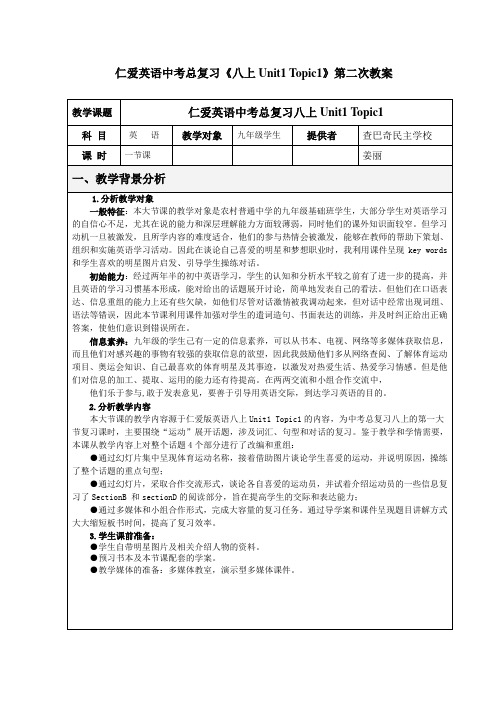
仁爱英语中考总复习《八上Unit1 Topic1》第二次教案五、教学过程教学过程师生活动设计意图及资源准备Step 1 复习导入1、通过一首To Be Number One歌曲,营造课堂氛围。
2、多媒体呈现图片和句型:—What's your favourite sport?—My favourite sport is __.回顾所学体育活动名称。
呈现学生喜欢的明星图片能激起学生学习欲望,活跃复习课堂气氛。
Step 2 合作交流1、多媒体呈现图片和句型:Which sport do you prefer, A or B?和Which sport do you like best, A, B or C? 学生分小组讨论各自的体育爱好项目,掌握选择疑问句。
2、多媒体呈现图片和句型Who’s your favorite player ?What are you going to be when you grow up ?让学生看图写话两两对话谈论喜爱的明星和自己将来梦想。
这一部分进一步激发学生的学习热情,也培养他们对生活的热爱感情。
Step 3 巩固延伸:1、多媒体呈现图片和句型: Why? Because it makes me strong and it is popular all over the world.. 引导学生利用对话巩固本话题重点短语,进一步升华话题内涵。
2、由对话操练转入独立造句。
根据课件所提供的图片情景和提示词,尝试用英语表达:I am going to play football. It makes me strong and it is popular all over the world.第1环节自然而然衔接了上一环节,加深了对学生的要求,同时又为第2环节的独立造句(遣词造句)做铺垫。
Step 4 归纳运用1、学生归纳重点短语,然后课件呈现本话题重点短语,师生一起分析、理解、掌握这些重点短语。
Unit1 Topic1 SectionD堂堂清-2021-2022学年仁爱版八年级英语上册
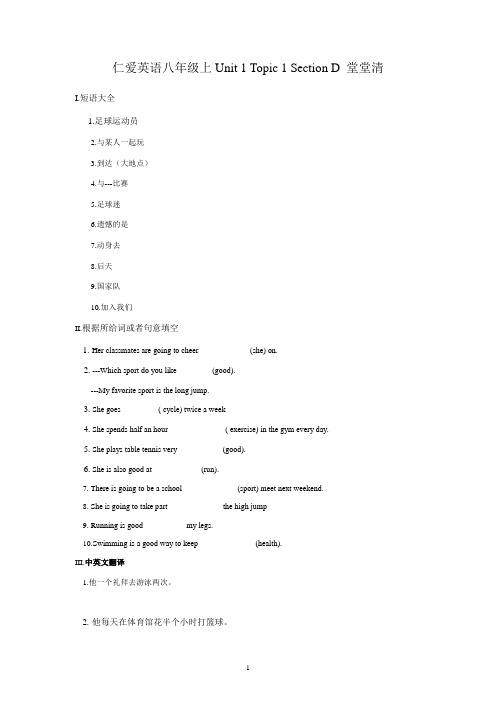
仁爱英语八年级上Unit 1 Topic 1 Section D 堂堂清I.短语大全1.足球运动员________________________________2.与某人一起玩________________________________3.到达(大地点)________________________________4.与---比赛________________________________5.足球迷________________________________6.遗憾的是________________________________7.动身去________________________________8.后天________________________________9.国家队________________________________10.加入我们________________________________II.根据所给词或者句意填空1.Her classmates are going to cheer ____________ (she) on.2. ---Which sport do you like_________(good).---My favorite sport is the long jump.3. She goes _________( cycle) twice a week4. She spends half an hour ______________( exercise) in the gym every day.5. She plays table tennis very___________ (good).6. She is also good at ____________(run).7. There is going to be a school _____________ (sport) meet next weekend.8. She is going to take part _____________ the high jump9. Running is good __________ my legs.10.Swimming is a good way to keep ______________(health).III.中英文翻译1.他一个礼拜去游泳两次。
八上 Unit 1 Topic 1 Section D教案

Kangkang
当堂训练:
1. She likes music. She will spend lots of money ______ CDs.
A. buys B. buy C. buying D. bought
2. He is good at volleyball. He tries his best ______ the
Unit1 Topic1Section D教案
授课人:
一、学习目标确定的依据:
1、课程标准相关要求:《英语课程标准》(2011年版)要求学生能够会读会写知汉意的单词和短语
单词:famous excited bad leave pity
短语:leave for
语法:一般将来时态
2、教材分析:
这是第一单元第一课题的第四课时,本节课以写作练习为主。本课以听、说、读、写相结合的方式力求话题和语法的完美结合,并复习该话题中的语言点和知识点。
1.leave(过去式))left
2. arrive in +大地点
arrive at +小地点
get to +地点= reach +地点
3.play against…与……
对抗/较量
4.for long很久
5.leave for…动身去…
6. the day after tomorrow后天
7. places of interest名胜
3、中招考点:
与be going to结构以及will有关的一些常见句型。
4、学情分析:
在复习SectionA-C的基础上,发现学生存在的问题。进行及时补救与练习,完成SectionD的所有内容。
- 1、下载文档前请自行甄别文档内容的完整性,平台不提供额外的编辑、内容补充、找答案等附加服务。
- 2、"仅部分预览"的文档,不可在线预览部分如存在完整性等问题,可反馈申请退款(可完整预览的文档不适用该条件!)。
- 3、如文档侵犯您的权益,请联系客服反馈,我们会尽快为您处理(人工客服工作时间:9:00-18:30)。
Unit1 Topic1 Section D
一、话题导学:(学习目标)
1. Learn some new words and phrases: famous, excited, bad, leave, leave for, pity
2. Review the future tense with be going to do:
(1)I’m going to play basketball.
(2)We are going to have a basketball game against Class Three on Sunday. (3)—Are you going to join the school rowing team?
—Yes, I am./ No, I’m not.
(4)She is going to take part in the high jump and the long jump.
(5)There is going to be a school sports meet next weekend.
(6)—What are you going to be when you grow up?
—I’m going to be a scientist.
(7)Her classmates are going to cheer her on.
3. Review Section A-C
二、预习导纲:
1、单词互译与记忆
1) famous 2) excited 3) pity 4) leave 5) bad ______
2、短语互译与记忆
1)play with 2)play against 3)stay for long
4)到达5)动身离开去……
3、句子理解与熟读
1) He arrived in Beijing with his teammates yesterday.
2) But it’s too bad that the team isn’t going to stay for long.
3)They are leaving for Japan the day after tomorrow for a game with Japan’s national team.
4)It’s a pity that they are going to______ for about two days.
三、课堂导练:
用所给词或词组的适当形式填空。
stay in, play against, happy, win, arrive
Dear Li Dong,
How is everything these days? I miss you very much.
I’m glad to tell you that Yao Ming 1 in Shanghai with his teammates yesterday. The China’s National Team 2 the South Korea Team. I hope they will 3 the match. Their fans are very excited(兴奋的). They sang and danced 4 . It’s too bad that they aren’t going to 5 Shanghai for long.
They are leaving for Japan the day after tomorrow.
Please write to me back soon!
Yours,
Wu Ming
1.__________
2.________
3.________
4.________
5.________
2.单项选择
( ) 1. The foreigners arrived _______ Shanghai _______ night.
A. at; at
B. in; at
C. in; in
D. at; in
( ) 2. Xu Xia and her teammates are _______ the U.S.A. next week.
A. leaving for
B. leave for
C. to
D. left
( ) 3. It’s too late . Don’t make him _______ for you so long .
A. wait
B. waits
C. to wait
D. waiting
( ) 4. We will ____ the city football club. Would you like ____ us?
A. join; to join
B. join; take part in
C. take part in; join
D. join; to take part in
( ) 5. _______ too bad that he won’t join the club.
A. It
B. That’s
C. This is
D. It is
四、复习自测:短文填空
阅读下面短文。
并借助上下文和插图。
补充所缺信息。
每个空只能填写一个形式正确、意义相符的单词。
2.26-meter-tall Yao Ming made his NBA debut (初次亮相) on October 23,2002 and got 6 points for the Houston Rockets in the game. Yao Ming, 22, has been a 1 in China for some time, Yao Ming said,“When you 2 it on TV, it looks very easy. But when you are playing in the NBA , it is really 3 .”He said that
4 the Houston Rockets was a new start and a new challenge(挑战).“I hope that
through very hard work I can
5 everyone happy and help the Rockets
6 more games.”he said. Yao Ming can
7 some English. Both he and his teammates can understand each other. They
don’t 8 there is a language problem. They say that Yao Ming is one of the best 9 in their team. They all 10 him.
1.__________
2.__________
3.____________
4.____________
5._____________
6__________ 7___________ 8____________ 9____________
10____________
五、课文解读:
1. He arrived in Beijing with his teammates yesterday.他昨天和他的队友到达了北
京。
arrive in+大地点/arrive at+小地方
2. But it’s too bad that the team isn’t going to stay for long.但遗憾的是队员们不能
久留。
It’s too bad that+从句/It’s a pity that+从句
3.They are leaving for Japan the day after tomorrow for a game with Japan’s national team.
他们将于后天动身前往日本,于日本国家队进行一场比赛。
Leave for...动身前往......这里用现在进行时态表示即将发生的动作。
类
似用法的表位置移动的动词还有:go, come, fly, move, start等等。
六、评价
内容等级自评小组长评价
预习情况 A B C D
课堂表现 A B C D
小组合作 A B C D。
